The AMD Ryzen Threadripper 3960X and 3970X Review: 24 and 32 Cores on 7nm
by Dr. Ian Cutress, Andrei Frumusanu & Gavin Bonshor on November 25, 2019 9:05 AM ESTCPU Performance: Web and Legacy Tests
While more the focus of low-end and small form factor systems, web-based benchmarks are notoriously difficult to standardize. Modern web browsers are frequently updated, with no recourse to disable those updates, and as such there is difficulty in keeping a common platform. The fast paced nature of browser development means that version numbers (and performance) can change from week to week. Despite this, web tests are often a good measure of user experience: a lot of what most office work is today revolves around web applications, particularly email and office apps, but also interfaces and development environments. Our web tests include some of the industry standard tests, as well as a few popular but older tests.
We have also included our legacy benchmarks in this section, representing a stack of older code for popular benchmarks.
All of our benchmark results can also be found in our benchmark engine, Bench.
Speedometer 2: JavaScript Frameworks
Our newest web test is Speedometer 2, which is a accrued test over a series of javascript frameworks to do three simple things: built a list, enable each item in the list, and remove the list. All the frameworks implement the same visual cues, but obviously apply them from different coding angles.
Our test goes through the list of frameworks, and produces a final score indicative of ‘rpm’, one of the benchmarks internal metrics. We report this final score.
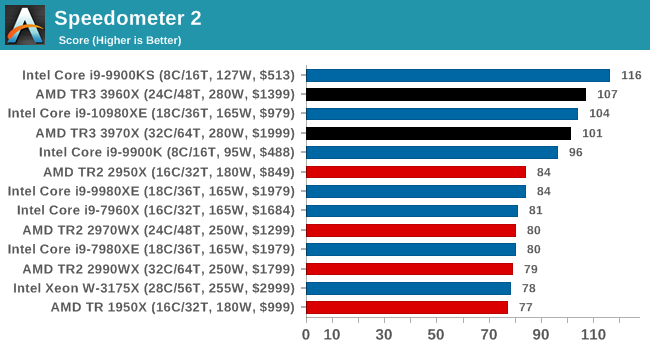
Google Octane 2.0: Core Web Compute
A popular web test for several years, but now no longer being updated, is Octane, developed by Google. Version 2.0 of the test performs the best part of two-dozen compute related tasks, such as regular expressions, cryptography, ray tracing, emulation, and Navier-Stokes physics calculations.
The test gives each sub-test a score and produces a geometric mean of the set as a final result. We run the full benchmark four times, and average the final results.
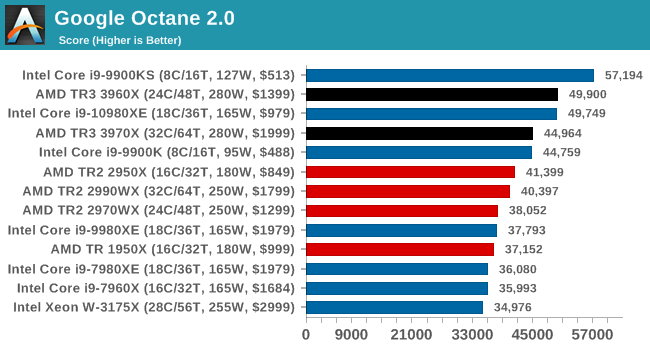
Mozilla Kraken 1.1: Core Web Compute
Even older than Octane is Kraken, this time developed by Mozilla. This is an older test that does similar computational mechanics, such as audio processing or image filtering. Kraken seems to produce a highly variable result depending on the browser version, as it is a test that is keenly optimized for.
The main benchmark runs through each of the sub-tests ten times and produces an average time to completion for each loop, given in milliseconds. We run the full benchmark four times and take an average of the time taken.
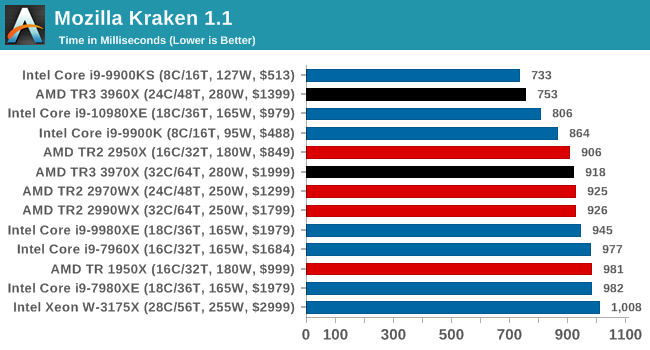
3DPM v1: Naïve Code Variant of 3DPM v2.1
The first legacy test in the suite is the first version of our 3DPM benchmark. This is the ultimate naïve version of the code, as if it was written by scientist with no knowledge of how computer hardware, compilers, or optimization works (which in fact, it was at the start). This represents a large body of scientific simulation out in the wild, where getting the answer is more important than it being fast (getting a result in 4 days is acceptable if it’s correct, rather than sending someone away for a year to learn to code and getting the result in 5 minutes).
In this version, the only real optimization was in the compiler flags (-O2, -fp:fast), compiling it in release mode, and enabling OpenMP in the main compute loops. The loops were not configured for function size, and one of the key slowdowns is false sharing in the cache. It also has long dependency chains based on the random number generation, which leads to relatively poor performance on specific compute microarchitectures.
3DPM v1 can be downloaded with our 3DPM v2 code here: 3DPMv2.1.rar (13.0 MB)
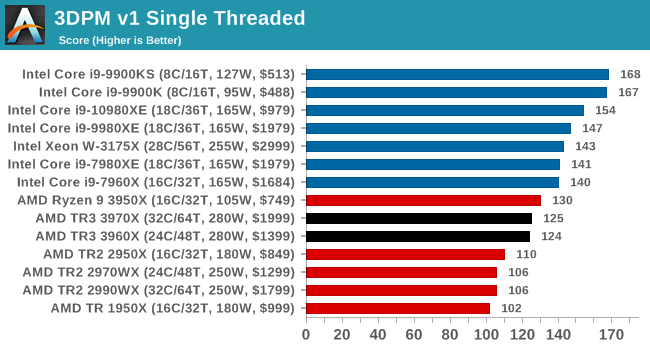
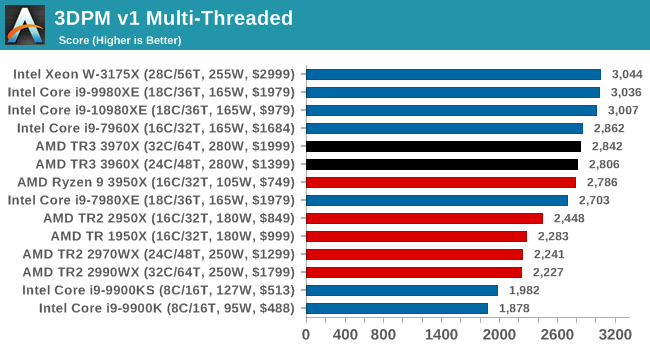
x264 HD 3.0: Older Transcode Test
This transcoding test is super old, and was used by Anand back in the day of Pentium 4 and Athlon II processors. Here a standardized 720p video is transcoded with a two-pass conversion, with the benchmark showing the frames-per-second of each pass. This benchmark is single-threaded, and between some micro-architectures we seem to actually hit an instructions-per-clock wall.
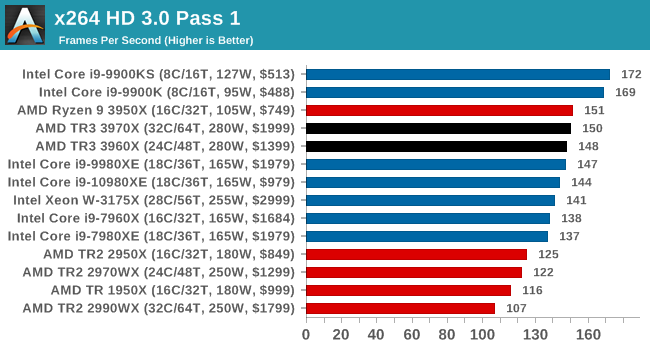
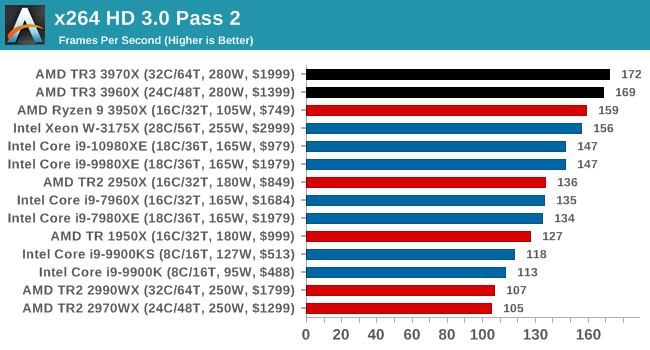
GeekBench4: Synthetics
A common tool for cross-platform testing between mobile, PC, and Mac, GeekBench 4 is an ultimate exercise in synthetic testing across a range of algorithms looking for peak throughput. Tests include encryption, compression, fast Fourier transform, memory operations, n-body physics, matrix operations, histogram manipulation, and HTML parsing.
I’m including this test due to popular demand, although the results do come across as overly synthetic, and a lot of users often put a lot of weight behind the test due to the fact that it is compiled across different platforms (although with different compilers).
We record the main subtest scores (Crypto, Integer, Floating Point, Memory) in our benchmark database, but for the review we post the overall single and multi-threaded results.
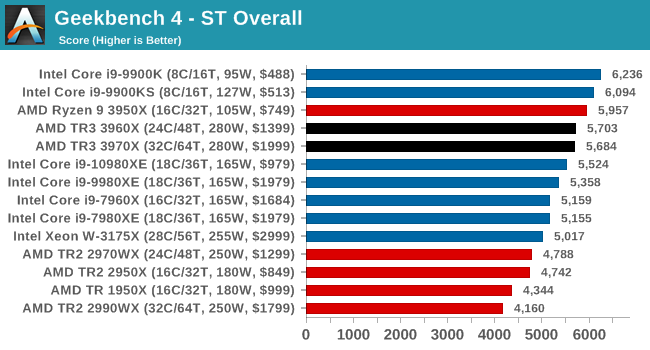
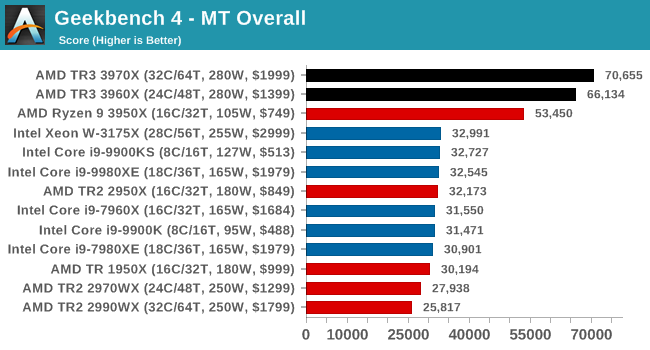










245 Comments
View All Comments
Irata - Monday, November 25, 2019 - link
Just checked Newegg and TR3 is listed at MSRP, whereas Core i9-10980XE is listed @ $ 1,049.99.That gives it the same per-core price as TR TR 3960X.
Note: All are "out of stock", so this is purely academic.
jordanclock - Monday, November 25, 2019 - link
It's only too expensive if your time isn't worth much. These are HEDT workstation CPUs, so the ROI for saving time is much different. Even being twice as a expensive but "only" 20-50% faster can be hugely valuable for many professional tasks.Teckk - Monday, November 25, 2019 - link
Ok I'm definitely not the target for this product. Interesting to see Intel reduce the price by half and still unable to match this.FunBunny2 - Monday, November 25, 2019 - link
"Even being twice as a expensive but "only" 20-50% faster can be hugely valuable for many professional tasks."being able to run 1-2-3 only on X86/DOS made both Intel and M$ a ton of money: i.e. the Killer App. not clear that there are enough 'professional tasks' to keep either Intel or AMD, much less both, profitable. with the killer amortization of capital expense in production of chips these days, the only avenue to profit is moving ever more units. HEDT, etc. ain't it.
eek2121 - Monday, November 25, 2019 - link
3D animators save quite a bit of time over lower core count parts. Go take a look at the blender results at Gamer's nexus. Note that it takes several minutes to render 1 frame. If you are rendering thousands of frames, the speed advantage of the 3970X over *every* other chip will pay for itself pretty quick.3D animation, video encoding, compiling large projects, etc. are all areas where Threadripper trounces anything Intel.
Ratman6161 - Monday, November 25, 2019 - link
This is the reason for the statement that buyers of the Intel CPUs in this segment usually go for the top of the line. I'm not the target audience for this sort of system but it seems to me that the people who are don't care about the price. If you are in this market to begin with its because you want the best you can get and are willing to pay for it. For most others, even the 3950X is overkill and the 4700x is probably the sweet spot.Dug - Monday, November 25, 2019 - link
This right here. When you are paying a contractor at $100 or more per hour, the price of a processor doesn't come into the equation. It's how fast the work can get done, so you don't have to keep paying $100 per hour.Haawser - Tuesday, November 26, 2019 - link
Exactly. I know people in the CAD/CFD world who think nothing of dropping $10,000+ on a workstation. Because to them it's a work tool as much as a pick-up truck is to a contractor.UglyFrank - Monday, November 25, 2019 - link
I feel sorry for the 10980XE, this is like having your debut fight against Floyd Mayweather Jr.Xyler94 - Monday, November 25, 2019 - link
I'm personally surprised at the 3950X in the CPU tests. keeping pace with the 10980XE, losing some tests, while beating it in others, it's incredible that even with a 2 core disadvantage, that little chip is proving to be punching above it's class.While you lose out Quad Channel Ram, and the huge many PCIe lanes, the 3950X is showing just how powerful it is.